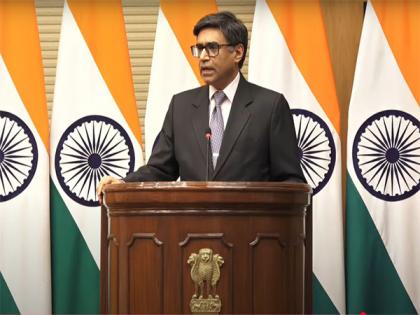India will put forward its perspective before IMF as it reviews Pakistan bailout package
By ANI | Updated: May 9, 2025 19:32 IST2025-05-09T19:28:37+5:302025-05-09T19:32:32+5:30
New Delhi [India], May 9 : India will put forward its perspective on the impending IMF bailout for Pakistan ...

India will put forward its perspective before IMF as it reviews Pakistan bailout package
New Delhi [India], May 9 : India will put forward its perspective on the impending IMF bailout for Pakistan at the board meeting of IMF scheduled today, Foreign Secretary Vikram Misri said on Friday.
"You must be aware that the IMF meeting is underway. We will put forward our perspective and our views with the IMF members. It is up to the Board as to what decision they take," India's Foreign Secretary Vikram Misri, told reporters at a press conference here in the national capital.
It is obvious that India will mount opposition to the bailout package to Pakistan, a country that supports terrorism.
The foreign secretary, however, was tightlipped as to what India will convey at the IMF meeting. Reportedly, Pakistan is seeking the next tranche of IMF bailout worth USD 1 billion.
India has sharply downgraded diplomatic ties with Pakistan after the April 22 terrorist attack on tourists in Jammu and Kashmir's Pahalgam, leading to the death of 26 individuals and several other injured, mostly tourists.
India suspended the Indus Waters Treaty of 1960, which would over a period of time will severely reduce Pakistan's water supply.
Earlier this week, sources toldthat India will also approach FATF (Financial Action Task Force) to include Pakistan in the grey list. Adding the country to the grey list would make it difficult for terror-harboring Pakistan to attract multilateral lending.
Asked about the status of Indus Waters Treaty, Misri said, "Indus Waters Treaty is in abeyance, and I have nothing further to add to the decision that was announced by Cabinet Committee on Security."
The Indus Waters Treaty was signed in 1960 after nine years of negotiations between India and Pakistan with the help of the World Bank, which is also a signatory.
A day after the horrific terrorist attack in Jammu and Kashmir's Pahalgam that led to the loss of 26 lives, mostly tourists, the Indus Waters Treaty of 1960 was kept in abeyance with immediate effect, until Pakistan credibly and irrevocably abjures its support for cross-border terrorism.
Separately, World Bank President Ajay Banga said the international financial institution has no role beyond being the facilitator of the Indus Waters Treaty between India and Pakistan.
"We have no role to play beyond a facilitator. There's a lot of speculation in the media about how the World Bank will step in and fix the problem but it's all bunk. The World Bank's role is merely as a facilitator," Ajay Banga was quoted as saying by the Press Information Bureau.
Banga met Prime Minister Narendra Modi here in the national capital on Thursday evening. Soon after, there were speculations that the World Bank will step in and interfere in the matter.
The Indus Waters Treaty allocates the Western Rivers (Indus, Jhelum, Chenab) to Pakistan and the Eastern Rivers (Ravi, Beas, Sutlej) to India. At the same time, the Treaty allows each country certain waters of the rivers allocated to the other. The treaty gives India 20 per cent of the water from the Indus River System and the rest 80 per cent to Pakistan.
Disclaimer: This post has been auto-published from an agency feed without any modifications to the text and has not been reviewed by an editor
Open in app